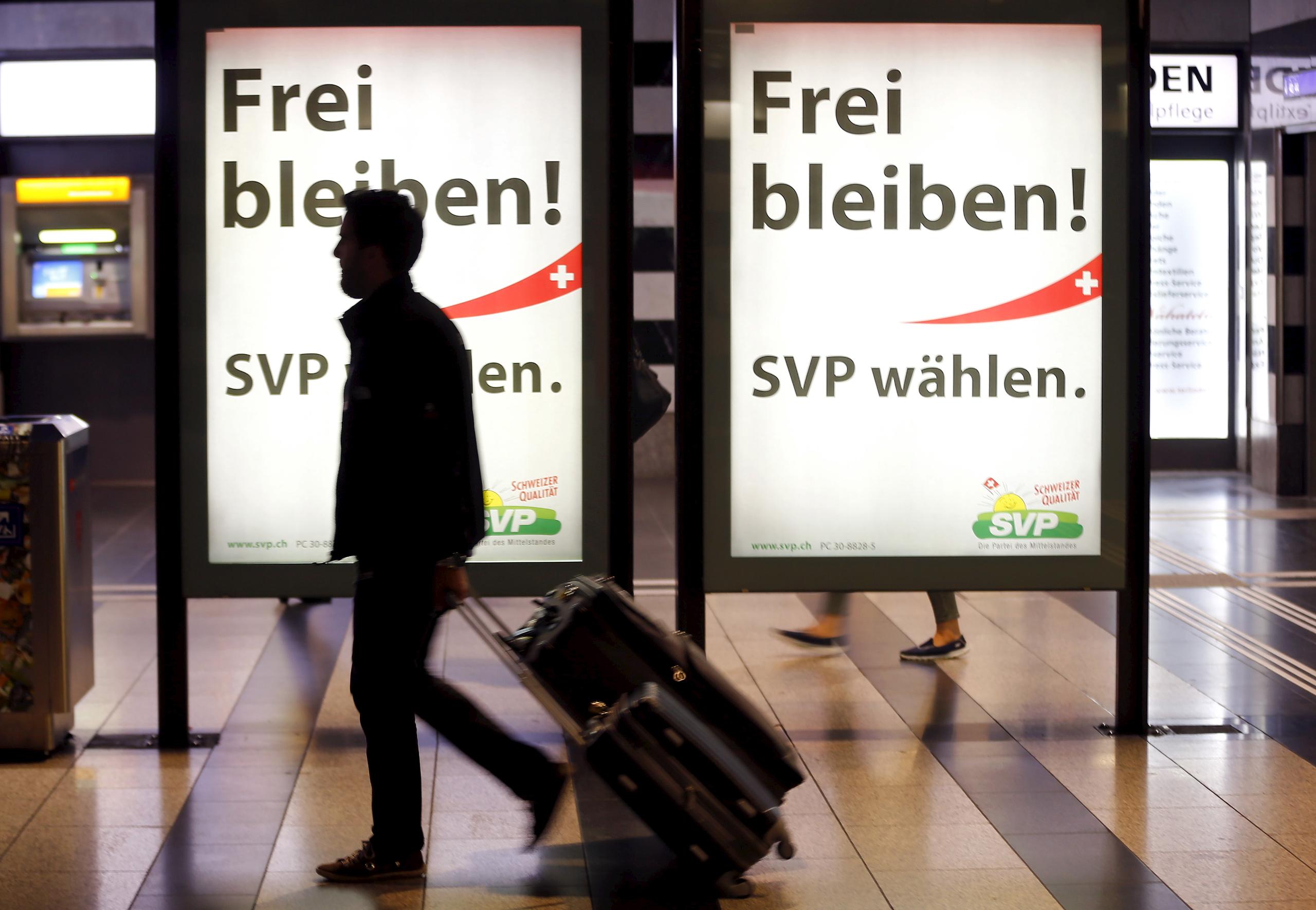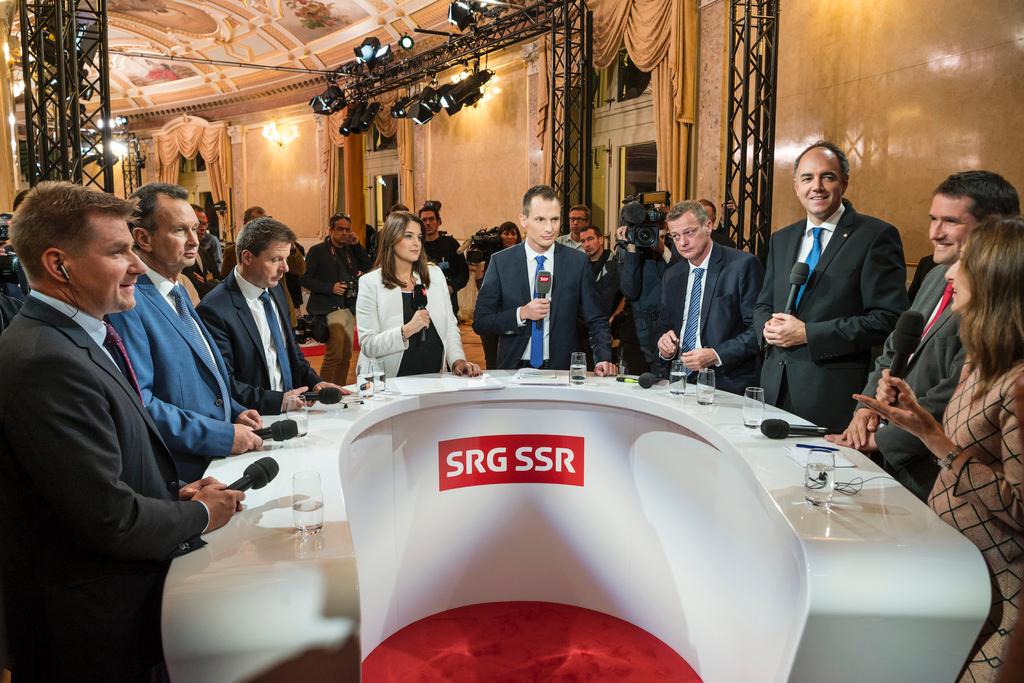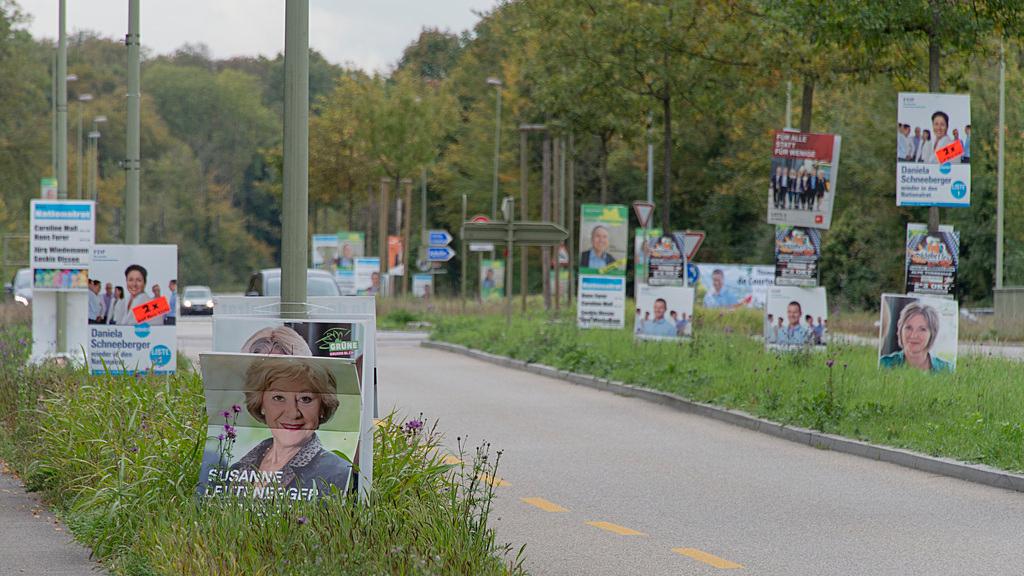Fear and isolation in a ‘divided land’

Swiss newspapers are focusing on the reasons for the expected shift to the right in Sunday’s federal elections – and what it means for the conservative right Swiss People’s Party’s claim to a second cabinet seat.
“The People’s Party sees a historic increase, the [centre-right] Radical Party a remarkable comeback,” wrote the Basler Zeitung.
Final results show the former increased its share of the vote from 26.6% in 2011 to 29.4% and the latter from 15.1% to 16.4%. Voter turnout was 48.4%.
The Basler Zeitung said the centrist Christian Democratic Party now had to “seriously think about how it wants to spend the next ten years. … It will have to decide whether it wants to return to the centre-right camp or continue to act as the office assistant of the [left-wing] Social Democratic Party”.
The Neue Zürcher Zeitung (NZZ) was not surprised by the gains achieved by the People’s Party and the Radical Party, which represent a “return to normality”.
“When voters think differently from large parts of parliament, corrections are inevitable … The confusion of recent years is history for the time being.”
The paper now sees the two parties “obliged to search for common ground in economic and social policies. If they fail to do that, they’ll carelessly gamble away their success”.
Equally unsurprised was the Berner Zeitung, which pointed to polls in the run-up to the election saying voters’ main concerns were asylum and refugees, immigration, the EU and Europe – issues where the political right could hope to score.
“These were the issues that dominated the pre-election debate,” the paper said.
The Aargauer Zeitung agreed, but wondered whether the People’s Party’s remedy would work. “In Switzerland it’s easy to call for something which sounds good, in the knowledge that it won’t find a majority and won’t have to be proved.”
Differences
The Tages-Anzeiger in Zurich saw post-election Switzerland as a “divided land”. “The new centre, which acted as a pivot between the two blocs in the previous legislature, has been penalised.”
It added that the pace and agenda would now be set by parties “which accept failure regarding old age pensions and the transformation of the energy sector”.
The Tages-Anzeiger expects the “new centre” from 2011 to go down as a paragraph in the history books. “2015 has seen the successful return to dominance of centrifugal forces. This starting position will be a burden for our country regarding international networking.”
Tabloid Blick said that “where differences exist, they must – as a service to the issue – be overcome by working together”. That goes especially for immigration policy and the bilateral agreements with the EU, it added.
Political chairs
The papers also turned their attention to the cabinet elections on December 9, when the seven-person cabinet will be elected by parliament. The main issue here is whether the People’s Party wins a second seat – as it says it deserves – most likely at the expense of Finance Minister Eveline Widmer-Schlumpf, whose centre-right Conservative Democratic Party slumped from 5.4% in 2011 to 4.1%.
“For the moment the winners’ speeches are still polite,” noted 24 Heures in canton Vaud. “But the pressure promises to increase on [Widmer-Schlumpf]. Her legitimacy is hanging by a thread.”
Le Temps in Geneva wrote: “Today, nothing indicates that a second cabinet seat for the People’s Party would be able to solve the complicated problem of a party which is incapable of governing with others.”
It added that if the People’s Party fought for the bilateral treaties with the EU, which the paper said are crucial for Switzerland, then it could be given a second seat – “but no one in the People’s Party currently seems reasonable”.
Der Bund in Bern reckoned that if Widmer-Schlumpf didn’t stand for a third term in office – to the benefit of the People’s Party – “she could have a chance of a place in the history books”.
Blick didn’t mince its words: “There is no place in future for a minister from the Conservative Democrats’ mini-party.”
It also spoke of a return to normality and to the “traditional order”, referring to the so-called “magic formula”, whereby the two largest parties in parliament each have two cabinet seats.
The Basler Zeitung admitted that the People’s Party, as the largest party, had a valid claim to two seats. “Anything else would be alien to the system.”
Foreign reaction
Editorialists in Switzerland’s neighbouring countries were equally unsurprised, but hardly welcomed the result.
“Out of fear the Swiss opt for isolation” was the headline in Germany’s Die Welt, which, along with other papers such as Il Sole 24 Ore in Italy, said the Swiss cabinet’s discussions with Brussels would now be even more difficult.
In France, Le Monde referred online to an “expected victory for the populists” following a “desperately dreary campaign” which had been dominated by asylum-related problems.
Libération said online: “While Switzerland has for the moment been spared the wave of immigrants arriving in Europe, the issue of immigration is voters’ chief concern. To the benefit of the populist right.”
According to the Financial Times, “the strengthening support for the [People’s Party] as Switzerland’s biggest party provides an early indicator of the European political fallout trigged by asylum seekers fleeing wars in countries such as Syria, and could presage rising electoral support for far-right, anti-immigration parties in other countries.”
Il Corriere della Sera in Italy, noting the election to the House of Representatives of Magdalena Martullo-Blocher, daughter of People’s Party’s billionaire figurehead Christoph Blocher, saw similarities with a French political family.
“In many aspects the ascent of [Martullo-Blocher] can be compared with that of Marine Le Pen, leader of the far-right Front National in France and daughter of the movement’s founder, Jean-Marie Le Pen.”

In compliance with the JTI standards
More: SWI swissinfo.ch certified by the Journalism Trust Initiative



You can find an overview of ongoing debates with our journalists here. Please join us!
If you want to start a conversation about a topic raised in this article or want to report factual errors, email us at english@swissinfo.ch.